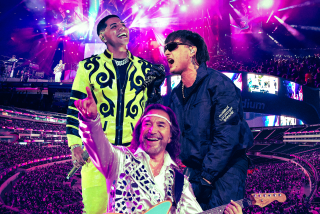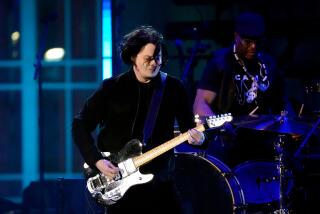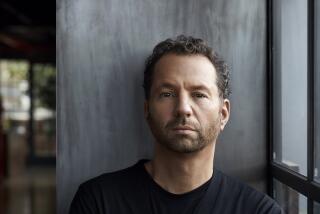Musical acts’ summer tours encounter heavy weather
This summer, the music industry has been repeatedly rocked — not by big beats, keening vocals and loud guitars, but by lackluster ticket sales and concerts canceled by a growing list of major artists.
This month, pop diva Rihanna postponed six dates on her “Last Girl on Earth” tour. The Lilith Tour was forced by poor attendance to cancel 10 concerts, and Christina Aguilera pulled the plug on her 20-date tour because of “prior commitments” in June. The Eagles scrapped stadium shows with country superstars Keith Urban and the Dixie Chicks because of sluggish ticket sales in May. U2 postponed its North American tour after lead singer Bono underwent emergency back surgery. The Jonas Brothers pulled out of a number of North American dates on their world tour. And “American Idol” producers canceled eight engagements and rescheduled other dates on the “Idols Live!” tour.
FOR THE RECORD:
Concert ticket pricing: An article in Friday’s Section A on summer concert woes said that the top ticket price for a Chicago concert featuring the Eagles, Keith Urban and the Dixie Chicks was $895. That price was for a VIP package, which included extras such as a seat in the first 10 rows, a pre-show dinner and cocktail party, and parking. The highest price for a non-VIP ticket was $203. —
“It’s brutal out there,” said Jordan Kurland, manager of such alternative music acts as Death Cab For Cutie, She & Him and Say Anything. “The economy is still not great and there’s a lot of distractions people can choose from. Going to big rock concerts is not one of them.”
In particular, the downturn has spelled trouble for Live Nation, the country’s biggest promoter of live music, which on Thursday informed investors that the company’s adjusted operating income for 2010 is projected to drop by $40 million, or nearly 10% below last year’s, despite a merger with Ticketmaster that enhanced Live Nation’s market position and required Justice Department approval. U2’s tour postponement alone will cost the company $6 million. And Live Nation said it expects a further 15% income drop for the top 100 tours in the second half of 2010. The company’s shares fell 11% in trading Thursday.
Rival promoters complain that Live Nation has contributed to the downturn by initially overcharging for tickets, then overcompensating by slashing prices in a last-ditch effort to fill seats. Tickets for the Eagles’ tour stop in Chicago, which also featured Urban and the Dixie Chicks, ran as high as $895, and the lowest-priced entry to Aguilera’s postponed tour cost $125.
Critics say the high prices were triggered by the company overpaying top artists — in some cases, handing over nearly the entire box office take — in order to secure their touring commitments against competitors. .
“They may well be worried about the amount of money they’ve promised some acts,” said Gary Bongiovanni, editor of Pollstar. “Their bread and butter comes from parking and concessions.”
Representatives for Live Nation declined to comment for this story.
With CD sales taking a nose dive over the last decade, the concert business enjoyed unprecedented growth with pop acts relying upon their touring incomes to offset lost revenue. But according to a study released this month by Pollstar, grosses for the top 100 tours in North America this year were down 17% from the same period in 2009, with losses expected to continue through year’s end.
According to Randy Phillips, chief executive of concert promotions giant AEG Live, the industry’s downturn comes courtesy of a “perfect storm” of factors.
“Artists aren’t making enough money on sales of recorded music so they’re trying to make money on the road,” Phillips said. “The problem is, you’ve got too many tours, the same acts going through the [touring] system year in and year out. On top of that, the economy is in a very fragile state of recovery and the Consumer Confidence Index is very low.
“You have years of mismanagement by the concert industry, treating the consumers like they’re idiots. All that coming together at one time? It’s like one big stop sign,” Phillips added. Despite that, he characterized AEG’s concert tours as doing “exceedingly well,” without offering specifics.
According to Chang Weisberg, founder and head of Guerilla Union, the concert promotion firm behind the successful Rock the Bells hip-hop tour, part of the industry’s current woes can be attributed to a glut of artists.
“The concert industry has seen overall ticket sales grow exponentially year after year,” Weisberg said. “But unless you’ve got a festival or a concert with something unique — a band that has stayed out of the marketplace, a new or unique record — the odds are it’s not going to be the hottest ticket in town anymore. There’s been a correction. Acts can’t just show up and expect to fill seats whenever they want.”
Paul Tollett, president of Los Angeles-based concert promotion firm Goldenvoice, said the company chose to “not be aggressive in buying a lot of shows” for 2010 in light of abiding economic concerns, sparing the company, owned by AEG Live, from the concert downturn in the process. The Coachella Valley Music and Arts Festival, which Tollett founded in 1999, has gone on to become the most successful concert event of the year — an indication that fans may be more interested in an immersive cultural experience lasting several days and spanning more than 100 bands than they are in going out to see one act perform a show on, say, a Thursday night.
“You go back 25 years, the big shows were on the weekends,” Tollett said. “Now you could have three shows on a Monday that are good. That’s hard for the consumer. There’s just so much to choose from.”
Lilith Tour co-founder Terry McBride similarly acknowledged the fierce competition. “We are in the midst of one of the most challenging summer concert seasons, with many tours being canceled outright,” McBride said in a statement this month announcing the tour’s cancellation.
There are exceptions. Gregg Perloff, founder and president of Berkeley-based Another Planet Entertainment, said that summer 2010 has been “very strong” for his company, citing sold-out engagements by Paul McCartney, Neil Young and Tool. Justin Bieber, Lady Gaga and Taylor Swift also have had strong sales.
While Live Nation resorted to last-minute price cuts and initiatives such as the “No Service Fee Wednesday” to attract customers, Another Planet took a different route. The company worked closely with the acts it booked to keep ticket prices affordable and avoided tacking on surcharges — such as the one charging customers for buying and printing tickets on their home computers — that many fans have come to resent.
“I have not had to discount one show this summer,” Perloff said. “You charge a decent, reasonable price from Day One and the public will respond by buying lots of concert tickets.”
Tollett feels that at a time of crisis in the music industry, some promoters may have lost track of their primary objective: giving the customer an experience to remember.
“It’s not just about selling tickets,” Tollett said. “This is a very human business we’re in.”
Times staff writer Todd Martens contributed to this report.
More to Read
The biggest entertainment stories
Get our big stories about Hollywood, film, television, music, arts, culture and more right in your inbox as soon as they publish.
You may occasionally receive promotional content from the Los Angeles Times.











